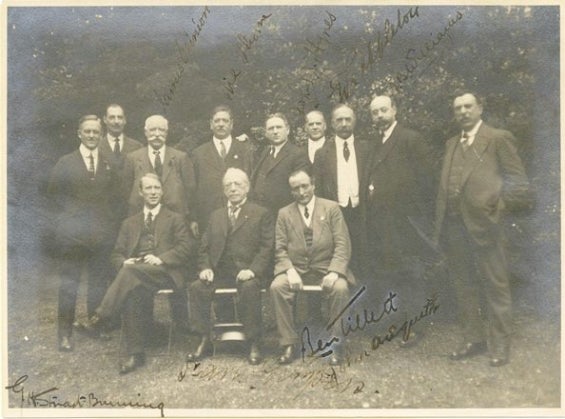Uncategorized
1911: The British Trade Union Congress

By the end of 1910, the Teamster International claimed more than 36,000 members. Although not among the largest of the AFL affiliates, it was growing in importance; however, the Federation did not give the Teamsters the respect as a union commensurate with its size and national impact. Tobin, along with other younger, more progressive AFL members, would play a role in changing some of the AFL’s practices for the better, and changing the standing of the Teamsters within the AFL would become one of Tobin’s main focuses.
At the 1910 AFL convention, he decided to be a candidate for AFL representation to the British Trade Union Congress scheduled for September 1911. His opposition for the position was a prominent candidate named Joseph Weber, International Secretary of the Musicians Union. Well-liked within the Federation, Weber was backed by its leadership powerhouse, including AFL President Samuel Gompers, AFL Secretary Frank Morrison, AFL Treasurer John Lennon, and AFL First Vice President James Duncan. At first glance, Weber appeared a shoo-in. Nevertheless, Tobin decided to try for the job. He campaigned for the position, with his friends, focusing on the younger convention delegates. When the votes were counted, he had won the position as representative to the British Trade Union Congress by a margin of 2-1. His election came as a “bombshell” to the old-time AFL leaders at the convention. Tobin was moving up and so were the Teamsters.
Having won the position, Tobin worried that he knew nothing about the British labor movement. He went to work educating himself on the issues from reports of previous delegates. With $400 the AFL had given him to cover his travel expenses and another $500 given to him by Teamsters, Tobin booked second-class passage in a shared room on a ship to Liverpool. Upon arrival, British labor officials welcomed him and made sure that he got on the right train to Newcastle-on-Tyne, where the convention was to be held.
At the convention, Tobin socialized and made important contacts. He also made bold moves to establish both himself and the AFL as serious labor representatives who should be treated as such. It had been the British Congress’ practice to allow delegates from outside Britain only 20 minutes of speaking time during its convention. Anyone speaking longer was cut off by a bell. Tobin considered the practice rude. When British delegates spoke at the AFL convention, they were not governed by time restraints. In his typical outspoken manner, he challenged the unfairness of the British Trade Union Convention practice. Before the convention, he informed his new British acquaintances that if he were cut off during his speech, he would see to it that British delegates received similar treatment when they attended the next AFL convention.
The British were both stunned by Tobin’s boldness and in agreement with his argument. The Chairperson of the British Congress promised not to cut Tobin off. When his time came, Tobin talked for 31 minutes, which was considerably longer than anyone had been allowed to speak at the forum in the past. But the room welcomed his rhetoric and, following the speech, gave him a standing ovation.
The British Congress lasted five or six days. Tobin’s view of the British, which had always been seen through the lens of his Irish Catholic upbringing, would forever change. He made many longtime friends at the conference and, although it was the AFL’s practice not to send the same representative as delegate to the Congress, over his career with the AFL, Tobin would return to the British Trade Congress in that role at least two more times.